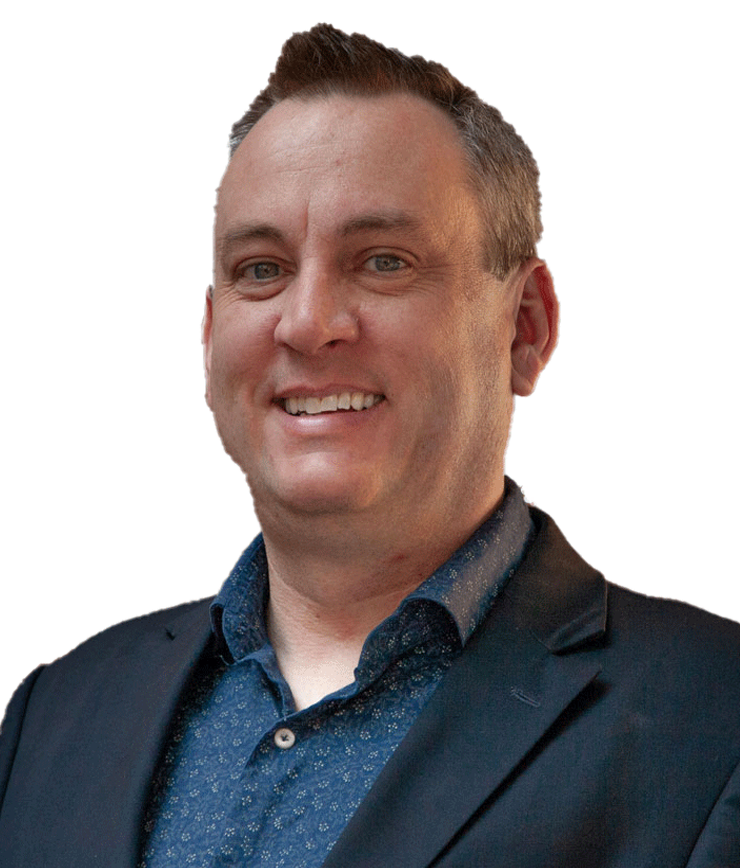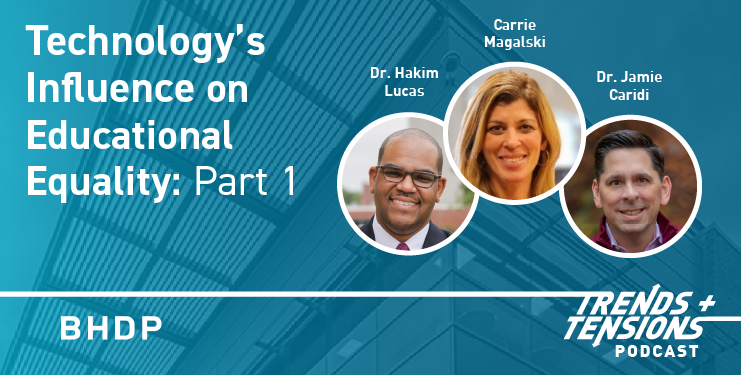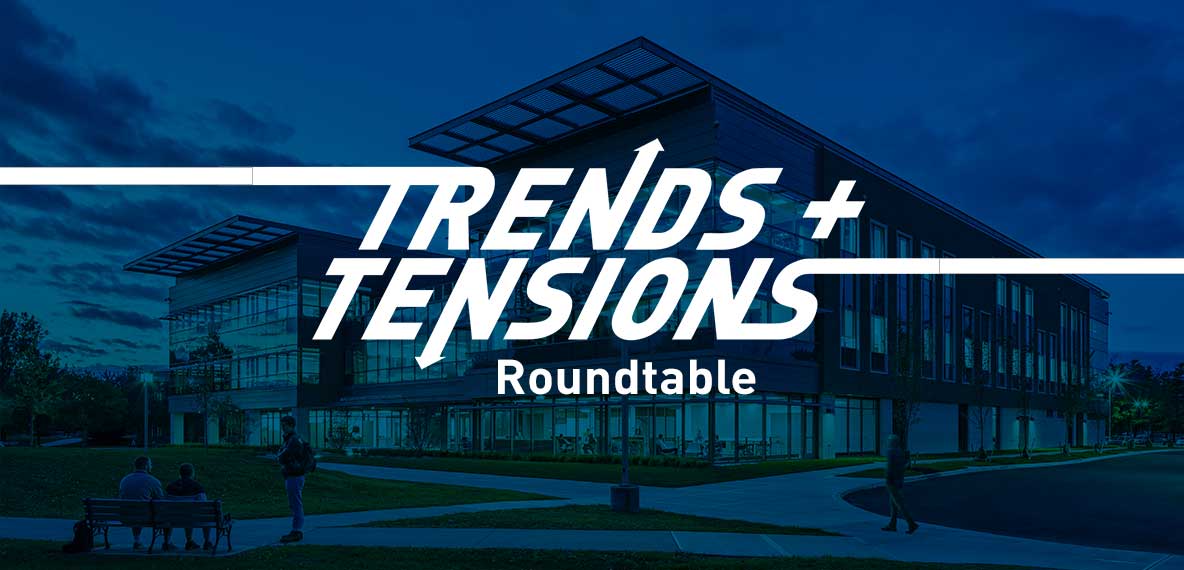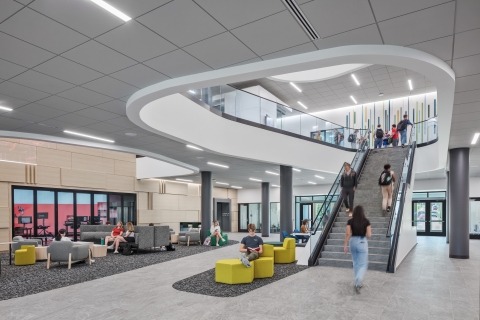
Technology's Influence on Educational Equality: Part 2
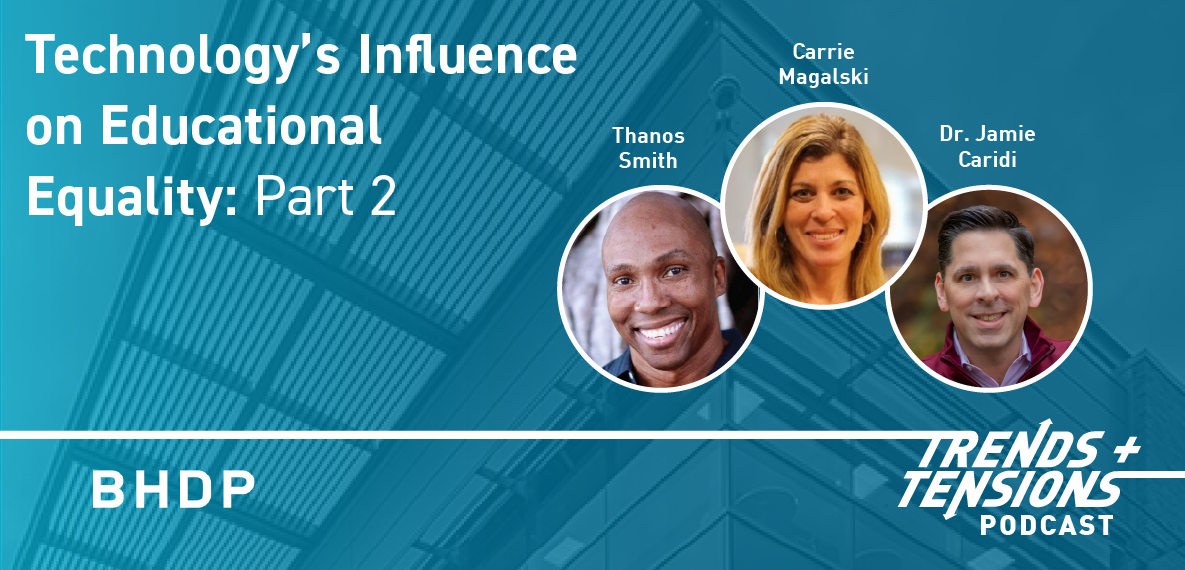
Want to listen on another platform? Choose your platform here.
Episode Transcript
(Music Intro)
Brian Trainer, Host: Welcome to a special edition of Trends + Tensions, presented by BHDP, where we discuss trends in Architectural and Interior design and the competing priorities or tensions that arise from integrating new ideas into existing organizations, enterprises, and institutions. This episode is part of the “Higher Education Strategic Partnership” series. In this episode “Technology’s Influence on Educational Equality: Part 2”, special guest hosts Dr. Jamie Caridi, President of Terra Firma, and Carrie Magalski, Director of Client Services for Terra Firma, chat with Dwight “Thanos” Smith, Chief Visionary Officer of Paragon VTOL, about the strategic partnership Paragon VTOL Aerospace has created with Virginia Union University. Technology is paving the way for the future, and Thanos and his company are leading the stride of technological advancements in society. From flying cars to electrically charged roads, Thanos and Paragon partner with Virginia Union University to give the students an education that excites and breaks the barriers of socioeconomic limitations. I am your host, Brian Trainer, senior strategist for BHDP. Let’s get started.
Carrie Magalski: So, Thanos, we were really excited to hear yesterday we spoke with President Lucas, who's dynamic, and he was very excited about the partnership that Virginia Union is doing with Paragon VTOL. So, we're really excited to talk to you and really just get some background on how you started this journey with what you're doing, a little bit about yourself, and then also, you know, how that partnership kind of took place and where you are with that.
Dwight “Thanos” Smith: Sure! I went to a college, a small teachers college called National Lewis, and in the admissions process, I learned that I was dyslexic and ADD. And then, I transferred eventually to Purdue University as a 4.0 student with academic merit. But I fell in love with learning, and all because of my college experience. I thought up until that point my teachers had failed me because how many kids like me are out there that are getting missed? So, they're put in the back of the classroom, they have this bell curb system, and we're at the bottom end, and we're already stereotyped. And then, in college, I was already learning how to fly in high school, so I was flying Cessna’s, a single-prop dual-prop aircraft, in college. I couldn't do aviation because I was on the football team, and it was on the far side of campus. So, I started studying marine biology instead, another one of my true loves, and so during that process, I really fell in love with education and a background in history and finance. And so, graduating, went on and successfully built companies, exited a couple, and screwed up in one. It didn't get where I wanted to early on because I was too trusting in the whole business process. So, I've got my life experiences. I don't call them really failures. They're more like life experiences. That was not where I felt my destination. I know always felt like I would get back into marine biology or to some form of aviation, and while on the highway heading to my daughter's track meet back in South Florida on the turnpike, I was getting delayed to show up for her meet, and I'm like congestions really suck—I refuse to accept that this is the best we can do as a society. So, I'm like, where are these Jetsons-type flying cars, they've been promising since I was a little kid in Jamaica, and here in America, they keep pushing all this stuff, and I'm seeing them in like Total Recall and Terminator, and all this other stuff. I said, “Well, let me go ahead and create it myself.”
So I packed up, moved to California, started Paragon VTOL in a coffee shop, and I took all the things I was working on and officially incorporated it, so it's not like I started on that date; I just wanted to make it more formal on that day and built an incredible organization that has now merged into the Paragon Universe more so than Paragon VTOL because the Paragon VTOL is probably the end game portion of our technology. But what I learned in the process since then is that there are probably 5 to 6 key components that are essential for this to be successful, and this is how Virginia Union came into play.
The first one is there is no infrastructure to support any of this VTOL industry, and it all stems through education, learning, physical assets, and everything else. And so we created this technology called the company called GTECH stands for Green Tech Energy Company, and what we do is we create energy grids that are solar-powered and water-dependent through a process called electrolysis to create electricity and hydrogen. That's something that's actually been around for a while, nothing brand new; it’s just a little different way of approaching it. What's unique and separates my company apart from everyone else is that our battery management system. We store the energy in the daytime, so at night, the system runs off the batteries, so you're constantly having a zero-carbon footprint. But, unique in the battery system is I don't use lithium; everyone’s using lithium. You've got the electric vehicle companies, and you've got the battery companies. We've created our own system; it's made from graphene. We're producing over a ton per day, and we're using a different process, and we've got our intellectual properties in place. They were doing that because we have this highly conductive electricity. We have to pass through opposite sides to store the energy; you’ll see it in real-time. This is part of the Paragon Universe research and innovation with Virginia Union that we're putting together right now.
I created Clearport Worldwide; that's our infrastructure company. There's no airport infrastructure, in my opinion, that works. If you look at the average airport, they're like 30 to 50 minutes from your house because they're loud, the noise pollution, they take a lot of space—hard space, and the equipment on there in my opinion, should be for a long-distance travel, but for intercity or state-to-state, we need VTOL aircraft. Our focus is to create more than 11,000 Clearports throughout the United States, wherever you live. So, that's really important. The beauty of having this partnership with VUU is Dr. Lucas is a visionary. I'm a Chief Visionary Officer, and it's very refreshing when you're running across another visionary because they understand, they get it, and they also can think ahead. And so, a lot of ways you can vertically align to make this thing a more impactful relationship. So, our Clearports are multimodal transportation hubs. With that being said, the electric buses of the future, electric cars, hydrogen vehicles, and even VTOL aircraft will use this infrastructure of the future, but we're building it today. And I'll explain what that means because we haven't officially announced it yet, but we have a really large project that’s a multi-billion-dollar award that we recently been notified we're receiving, and we're going to have our signing ceremony next month, so that's our Clearport.
Then we NV motor group. I created NV because of two reasons. One, the energy grid really is just not reliable; I’m sorry, it's just not. Clearport and NV are kind of working together in a lot of ways. NV stands for Neighborhood Vehicle, that is a frame that we use off the rack, so to speak, with a company called Dash Motors. We use their frame to incorporate some of our vision and technology inside that are borrowed from GTECH and Clearport Worldwide, which is our smart paint technology. It's a nano tubular technology that melts the ice on any surface area. We can blend it into the roads, so no more freezing rain, black ice, or snow accumulation. With the push of a button, within less than 80 seconds, it will melt. We tested it about a year and a half ago at the NASA laboratory on four 16-foot-long windmill propeller tips. The mission was to lay a strip of our smart thermal paint technology on there, then pour water on it, freeze it overnight, and then come back in and demonstrate the ability to melt the ice and have consistency along the surface area. We plug it into a power source that was about 530 watts, so it's like 4 or 5 light bulbs of power, very minimal. The temperature within 82 seconds went from 26 degrees to over 160 degrees in the surface area.
When you think about the roads today, snow accumulation that's a problem. When that happens, people actually get injured, or fatalities occur. So, our company GTECH will install this material on the road surface area, and then cities will have the ability to turn on, monitor the road conditions when it gets too cold, and it can activate the roads to keep it warm, so it doesn't accumulate ice. That's actually happening this year, so we're pretty stoked about that. And we're going to be teaching the folks, the students at Virginia Union, how this works and how to install it. And then, our goal is to expand it throughout the HBCU communities and other schools, if you will, because those partnerships are truly important. And then we have the ability for our graphene blended with the Portland cement and other substrates, but an average surface of a road is anywhere from 8 to 12 inches thick and can handle about 4,000 pounds per square inch of pressure, that's 4,000 PSI. Our material, when blended with it, goes up to 10,000 PSI within 28 days. And then you go into, like, what we did with NV Motor Group. So, NVs are cars or our neighborhood vehicles; they don't go on highways. I have no understanding; I don't have a plan to make a highway-rated passenger vehicle; I don't think it's necessary. The reason why I started this company was to get off the highway, not get back on the highway with a car that's highway rated. So, NV Motor Group are city vehicles. They're like, think of them as a glorified golf cart that has heating and air conditioning and a windshield wiper and are more safe and so on and so forth. Having a blended exterior frame with our graphene blended material, graphene, and aluminum. For the NV2, which is exclusively within the Paragon portfolio, that's coming out this year at the end of the year. We're going to roll that out; NV2 has a frame that is five times stronger than steel. It is blended with aluminum, so it's super lightweight. But here's the kicker; our frame, based on the technology in our roads, our Clearport infrastructure, and now in our cars and eventually in our aircraft, the frame is the battery. There's no major battery source. And we're developing initiatives and curriculum at VUU to be able to understand what this alien-type technology is. We're creating curriculum within the university to help these students and eventually as a test model, so we can extrapolate it across all colleges, universities, and high schools.
Dr. Jamie Caridi: Hey Thanos, how are you staying ahead of all the big manufacturers and the Elon Musks of the world? Is it an IP patent kind of thing?
Thanos: We have an enormous portfolio of IP, but the truth about IP, you get a good lawyer, and you get a patent that's published even when it's pending, you get a good attorney, you can circumvent that deal. It's about market share, and it is about your ability to execute, and I think right now we are not competing with the big manufacturing companies; we’re not competing with the “Musk’s” of the world. We have no intentions of getting into that space; we’re just going to stay in our lane and do our business model. We're not an acquisition target, and I don't think we'll ever be anytime soon. I like the vision of where we're heading, and I think if things play out, we may have just become the most important organization in the history of this planet, given what I've laid out so far. So, we have to measure and temper our expectations and just stay in our own lane. We're developing with VUU a software component division to help these students because I'm a big fan of STEM. I think STEM is the future. What we're saying is don't be afraid of technology; embrace it. And in fact, academia can play a major role in that. That’s where the money will be at. We're focusing on trying to create these opportunities in the partnership with VUU and other schools. I was not a fan of the educational system. I felt it failed me up until I got to college, and the more I talk to a lot of my colleagues, there are a lot of people out there like me that are dyslexic or just left behind for whatever the reason is. Education now has become exciting for me, but I also think education needs to adapt. The times are changing, we have to go into education 3.0, and I think that all across the board, there's enough opportunity there, so we're going to do a research Innovation Center at VUU to support this.
Carrie: So, you're making your whole model sustainable for the future, for future generations?
Thanos: Absolutely!
Carrie: That's incredible!
Dr. Caridi: What other questions about the relationship with VUU? I mean, gosh, we could take 10 hours of your time, Thanos. When you think about your relationship with Hakim and Virginia Union and its students, let's just fast forward 5 years and give us kind of in your mind what success looks like from that relationship. Kind of put some flesh on the bone for us about what's happening with those students and what it looks like.
Thanos: It's very exciting because what Hakim is doing is they're actually going to replicate a large percentage of the Paragon Universe on that campus, so we could use it more like an incubator lab, and then we're going to expand that through other HBCUs and community partnerships to take it a step further to bring it out of that laboratory into the real-world setting. And then take that and beyond that, so the students that are in there within the next five years or so will have a chance to be a part of that, but they're also creating the pioneering infrastructure group, if you will, for the 21st century, not just from an education standpoint, from a job creation standpoint, but also by building enough to create an endowment for the university to be able to challenge the likes of your bigger corporations like your Harvard’s, your MITs, Etc. Because you're using technology like our graphene, our thermal smart plane, our VTOL, our opulentus current, if you look at schools like Prairie View A&M, more than 80% of all black engineers come from Prairie View A&M outside of Houston. And so now you're going to see more engineers popping up left and right that Virginia Union is going to put out in the field that was not there before. So, I think that's really important.
You'll see a different teaching approach in a classroom that wasn't there before anywhere else in the country and their willingness to collaborate with other institutions, they've offered it to the city of Brownsville to their educational partnership, and they've offered it to the educational system in Jamaica to create partnerships, and Paragon is bridging these gaps. So they're doing things that other colleges are not really doing anymore because it seems like there's a big push for just enrollment numbers, whereas Virginia Union's saying, “Hey, we want enrollment numbers too, but we also want to make sure we do the right thing for our students,” and I think that's where Hakim has really been a visionary on that and promoting the platform, so when they graduate they each own an NV. So, you go to college; you pay all this money for college; what do you get for that? A piece of paper? He wants them to graduate with a car as well. So, they’ll have a car; they’ll have a job opportunity to have all these different things at their deal that was not there before.
Dr. Caridi: He wants them to have an LLC, too, doesn't he? I thought he said at one point.
Thanos: LLC, yeah, that's me. Each one gets a company.
Carrie: Wow! I'm excited to follow along with, you know, everything you're doing, and I saw your humanitarian as well; I think with what you've done in Jamaica, it's an honor to be able to talk to you.
Thaos: Thank you, thank you.
Carrie: And everything you're doing is just amazing. Good luck to everything, and I'll definitely be in touch!
Thanos: You got it right!
Carrie: Thank you for your time today, Thanos.
Thanos: Thank you all!
Carrie: All right, take care.
Brian: Thank you for joining Trends + Tensions presented by BHDP for this special episode, “Technology’s Influence on Educational Equality: Part 2,” with contributing hosts Dr. Jamie Caridi and Carrie Magalski, and their guest Dwight “Thanos” Smith, Chief Visionary Officer of Paragon VTOL. If you appreciate what you have heard, please rate, subscribe, and give us a review. I am Brian Trainer, your host, and I hope you’ll join us for another episode of Trends + Tensions to see what topics drive design.
Author
Content Type
Podcast
Date
May 16, 2023
Market
Practice
Topic
Technology
Higher Education Strategic Partnerships

